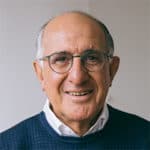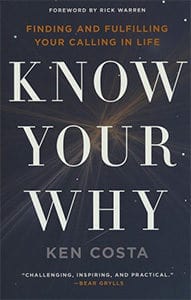
The War of Words
In this Adventures in Odyssey drama, a carelessly uttered word from Eugene creates havoc as it becomes the fashionable insult, resulting in a lesson about the power of words.
Home » Episodes » Focus on the Family Broadcast » Finding God’s Purpose for Your Life
Preview:
Ken Costa: If you know your why, you’ll find your way in life. If you don’t know your why, everything else is in the way. But if you know your why, somehow those mountains don’t appear to be as big as they were.
End of Preview
John Fuller: That’s Ken Costa sharing an insight about finding God’s will and purpose for your life. Welcome to another program. This is Focus on the Family with your host, Focus president and author, Jim Daly. I’m John Fuller, and Ken’s gonna help us find that purpose and meaning that everyone of us longs for in our spiritual journey, in our work, and in our life together as a family.
Jim Daly: Uh, John, there are those who feel like they’ve hit their sweet spot maybe in all those categories they feel fulfilled in every way, um, things are going well. And for whatever reason it’s working out well for you, and congratulations. There are many, many others though, who aren’t sure, they’re not quite sure what the Lord wants them to do, they’re struggling. I’m thinking of the 20, 30 somethings that aren’t, uh, aware of what God would like to do with their lives, and they’re waiting…and today we do wanna discuss how you, um, hear from the Lord, how you think and prepare so that you’re ready, uh, for that call. And how do we know when that call comes? Those are big questions, and we’re gonna tackle those today on Focus on the Family.
John: Yeah, and Ken is, uh, here to speak about that. He’s an investment banker. He’s been doing that for more than 40 years, but he’s invested in far more valuable things than the financial world. Uh, he speaks into the lives of young people, uh, about building God’s kingdom and, uh, he’s written a book called Know Your Why. That’s W-H-Y. Know Your Why: Finding and Fulfilling Your Calling in Life.
Jim: Ken, welcome to Focus on the Family.
Ken: Thank you, it’s great to be, uh, to be with you.
Jim: Now you have that wonderful British accent, so you’re residing in London?
Ken: I don’t think I’ve got the accent (laughing).
Jim: Okay, touché. Welcome. Welcome to America.
Ken: We love America (laughing).
Jim: And we’re grateful for that. Let me ask you, I- I saw the title, Know Your Why, and my first thought is, “What is my why?” We’re getting into the wh- where and why stuff, but what is my why? What do you mean by the word why?
Ken: What I mean by the word why is that deep inner conviction that the spirit of God puts upon the people of God, that they matter to God in all aspects of life, not just in the church aspect.
Jim: Mm-hmm.
Ken: And that’s what I really mean. There is a spirit that’s working long before people try and say, “Well, how will I serve God? Where will I serve God? When will I serve God? How long, oh Lord?” But unless you tackle the why question, that there is a purpose to your life, those others become much more difficult to answer.
Jim: Why do you think we separate those, uh, attributes? Um, our vocation, our spiritual walk, our family? Why do we struggle integrating those-
Ken: But that’s-
Jim: … under a faith umbrella.
Ken: … that’s such a good question. I’ll tell you why I think it is. I think that the world that we’re living in is a very siloed world…very atomized. It’s trying to divide us into different parts. This is your family life, this is your work life, this is your spiritual life, this is your school life, this is where… And nothing holds together. But Paul writes to- to the Colossians, he says, “In Christ Jesus, all things hold together.” And that’s the great thing we have, is to be able to pull them together in Christ Jesus.
Jim: For that person that’s going to church but, uh, waking up on Monday, maybe in the business world-
Ken: Sure.
Jim: … you spent 40 years in banking-
Ken: Sure.
Jim: … you can live a bifurcated life.
Ken: Totally.
Jim: Ho- how does a person take the assessment to say, “Okay, something is not right. I’m not integrating my faith.” Wh- what does that look like?
Ken: Well, what it looks like, is you have to have one thing in mind when you go to work, that my workstation is my worship station.
Jim: Hmm.
Ken: If your workstation and your worship station run together, you’re gonna live an integrated life. If you’ve split the two up, you’ll just screw yourself up.
Jim: Hmm.
Ken: Mentally, physically, emotionally, you’ll try and be, you know, hard at work, competitive from Monday to Friday, and then the kind dad, uh, father to the kids, good husband, well relaxed at the weekend. It doesn’t work.
Jim: So, for you in banking business, Ken, where there moments where you acted out of character? The stress of competing for that big contract.
Ken: Sure. Sure.
Jim: Ho- how did you manage that as a Christian man?
Ken: Well, we fail (laughs) from time to time. We don’t get it right. Um, the- the Christian life isn’t the calling to be perfect.
Jim: Yeah.
Ken: But I know this, people often say to me, “Well, it doesn’t make you a better banker because you’re a Christian.” Answer is, no, but it makes me a better Ken as a banker.
Jim: Hmm.
Ken: And better able to cope with the hardship, the c-… the harsh commercial compromises of the world in which we’re living.
Jim: Mm-hmm.
Ken: We’re not living in some neutral place. We’re living in a place which is tough. I don’t have to tell any of your listeners about stress and they don’t have to tell me, because I know about it, and they know about it, and you know about it. And stress is a 24/7 phenomenon. And we need to learn to be able to cope with that, and I believe that the power of the spirit of God enables us to be able to deal with this continuing stress that we’re living in, and to find a way in which we can live well in the modern world.
Jim: Mm-hmm. So, how did you find your why, and wh-… how was it defined?
Ken: Well, it changes over a period of time.
Jim: Mm-hmm.
Ken: You know, you- you need to find your calling. Some of us work for cash, nothing wrong with that. I’ve worked for cash. Some work for a career. Nothing wrong with that. I’ve done that. Some work for a great cause, a great voluntary organization, or not for profit, as this one is. But if you don’t work for a calling, if you don’t know your calling, you will burn out. So, it’s very important to get to a stage where you have that deep inner sense that Jesus Christ has called me specifically into a task that He has given me to do. And for me to come to the question, it was to be a good banker, and a good husband and father I hope as well, but also to have a twin track of working in the voluntary world as well for the church and in- in small connect groups and writing books, uh, and preaching and teaching.
Jim: Mm-hmm.
Ken: But above everything else, it is that in Christ Jesus all things hold together.
Jim: Ken, let me ask you, the, um, the reason we kind of shortchange ourselves when it comes to vocation, oftentimes in a meeting with the folks who support this ministry, um, sometimes they’ll feel, um, I don’t know, maybe that they’re not as significant because they’re not working directly in ministry, but they’re doing banking, they’re doing oil and gas, they’re doing real estate, they’re doing these vocational things that for them in their own self-perception isn’t as credible. That’s not the way to look at this, is it?
Ken: No, it’s not. I mean the sad thing is then of course what happens is that the pastors in the church, for no reason that I could blame them, ’cause they’re not trained that way, will think of the business community as a good milks cow, get some money out of them to keep the whole show running. The best pastors say, “Look, how can we invest in you to recognize that there is one indivisible Lord. The Lord of the money markets is the Lord of mercy. The Lord of profit is the Lord of prayer. The Lord of competition is the Lord of compassion.” There is one indivisible God. We can’t divide Him up and say, “Oh, well, you go off to do filthy stuff and work, and we’ll do clean stuff in the church.” Not at all. We all work together-
Jim: Mm-hmm.
Ken: … and we need to help each other to find our callings in life.
Jim: I remember making a thank you call for a gift here at Focus and, uh, the donor couple on the other end, the husband said, “You know, um, my wife and I appreciate the fact that you run Focus effectively and efficiently for us to do ministry through you.”
Ken: Yeah, yeah, yeah.
Jim: And at first I went, “Uh, what (laughs)?”
Ken: Yeah.
Jim: But he’s absolutely right.
Ken: Absolutely. Yeah.
Jim: My goal is to run Focus-
Ken: Brilliant.
Jim: … as effectively and efficiently as possible-
Ken: So good.
Jim: … so that people can support the ministry and do ministry through us.
Ken: Yeah, and a great steward also of that resource.
Jim: I love that concept.
John: Mm-hmm.
Ken: That’s very good.
Jim: That puts-
Ken: Yeah.
Jim: … that mix it all together.
Ken: It does. It does.
Jim: Uh, that the person now doing the vocational thing, earning a living-
Ken: Yeah.
Jim: … and then supporting their church, supporting ministries like Focus-
Ken: And it honors that person as well.
Jim: It does.
Ken: You know, it honors the giver-
John: Mm-hmm.
Ken: … uh, it doesn’t sort of deal it as, you know, you- you’re a second-class citizen. You know, I’ve given my money to a good person, a good organization, to steward it well.
Jim: Yeah.
John: And- and Ken, it comes down to what- what do you advise somebody in their 20s that wants to… I mean they’re passionate-
Ken: Sure.
John: … about following God-
Ken: Sure.
John: … uh, calling and career-
Ken: For sure.
John: … feel kind of separate to them.
Ken: Sure.
John: Uh, how do they… this is really a stress point for a couple of my kids.
Ken: Well, and- and for generations throughout the world. And I’ve been traveling all throughout the world, it’s exactly the same. And here’s the issue, never before have we had, uh, an aging population that is gonna grow much older. While young people have got so much choice that they’re totally overwhelmed by the choices.
John: Mm-hmm.
Ken: We live in a multi choice world-
John: Mm-hmm.
Ken: … and whereas I, you know, can look back at my career where I had my two or maybe three jobs. There is nobody in that millennial group that will not have six, 10, 12, different jobs. One job will start as an entrepreneur and you’ll pivot into something else.
John: Mm-hmm.
Ken: How is it that you can then, and this is what we need to help people to do, to focus on your calling now to be fully committed to what you’re doing now, believing that that’s where the Lord has got you to be, whilst at the same time keeping an openness to the Spirit leading you to the next.
John: Mm-hmm.
Ken: Now the difficulty for the generation is there’s a constant expectation of FOMO, the fear of missing out.
John: Yes.
Ken: I’m gonna miss out un- unless I grab the next opportunity, and rob yourself of enjoying what God has given you to enjoy and to work at in your calling, in your groove, right now.
Jim: What are those practical steps as you’re looking for your calling? H- how do you map something out to say, “Step one, step two?” Is it… is it that analytical?
Ken: Oh, well, it’s… it is in part analytical, because it’s very biblical. And, uh, the Bible is full of very good advice, uh, all of which is recorded in the wonderful book, but let me give you a quick summary of it. First thing to do is to consider well, just consider what the opportunity is. Second, consult with other people who are around you, got skin in your game, who- who are actually-
Jim: Mm-hmm.
Ken: … going for you. Third, clarify the issue. Tweet it to yourself, 140 characters. I’m facing a job change. 140 characters. What is the real question? Because so often we forget what the question is and muddle ourselves up.
Jim: Sure.
Ken: And fourth, you need courage. The courage to make a decision once you’ve clarified it-
Jim: Mm-hmm.
Ken: … and in my experience, particularly for younger people, they’ve clarified it, just haven’t got the courage to take onto the next step. And there’s great biblical precedent, can’t go into them all, uh, for- for us being able to be courageous.
Jim: Mm-hmm.
Ken: “Fear not,” says Jesus, you know, “I’ve overcome the world.”
Jim: It’s this constant tension between preparation, planning and trusting. And I think that’s something that- that is, um, we hold that in- in a certain tension, don’t we?
Ken: Well, we hold it in a tension, but it’s not an unresolved tension. In other words if you keep holding things like that in tension, you’re gonna do your head in.
Jim: Right (laughs).
Ken: Because you- you just can’t cope with it. It’s holding them together on the basis that not everything is disclosed to us immediately.
Jim: Mm-hmm.
Ken: There are waiting periods, you know, J- Jesus is not going to give you the a-… God isn’t Google, I can’t get my why by Googling it, because there is a time of seeping, of preparation, of- of- of actually preparing beforehand. And then those tensions, once given to God, you know, surrendered to Him, actually become things that we can live with-
Jim: Yeah.
Ken: … rather than- than stuff that just eats us up.
Jim: Mm-hmm.
Ken: I can’t resolve it now and, you know, just, you know, just eats at you.
Jim: What about that situation where you’re ping-ponging, uh, and I’m thinking of someone I know who has vacillated between finishing seminary, bouncing back into business, and it, to me as an observer, it’s- it’s more the waning of passion in between these-
John: Mm-hmm.
Jim: … two destinations. So, he’ll do business for two or three years, and then feel n-… unfulfilled, and then wanna jump back into direct ministry, become a pastor, become a missionary. Then that wanes, and then they wanna jump-
Ken: Yeah.
Jim: And I think a lot of young people are in that spot-
Ken: Yes.
Jim: … where they’re- they’re kind of vibrating between directions.
Ken: Yeah.
Jim: What do you do for that?
Ken: Well, what you do is you’ve got to take control of your destiny. It is true that, uh, Jesus Christ is our leader and shows us the way, but He also expects us to take control of our hearts, our minds, our imaginations, and not just to be knocked from one side to another. So, there is a responsibility that rests in taking control of, you know, your- your direction, rather than being pushed about by whatever the sort of current mood, or the current feelings might be-
Jim: Yeah.
Ken: … in a… in a particular workplace or in a church. And then just drift, and if it doesn’t work out, “Oh, I’ll go traveling.”
Jim: I can remember even before coming to Focus on the Family, um, um, I as working in business. I studied my last year at Waseda University in Japan, I was totally geared toward doing international business. And I felt pretty confident the Lord was calling me into that.
Ken: Sure.
Jim: And I had an interest in it, I had a desire, and then over a short period of time, probably four or five years, I was probably 28, um, I got a phone call with Focus and they asked if I’d be interested in coming to work here. And I can remember talking to this person, and they were in the business world, but had retired and moved into ministry. And I remember him coaching me to say we need good Christian representation in the business world. I would cautiously consider that move, but I would encourage you to stay in the business world. Now obviously I made a different decision, but that kind of sound wisdom was, uh, helpful to me to even sort out the final decision that I made. How critical is that kind of input from a friend or a mentor-
Ken: Oh, I think it’s vital.
Jim: … and then secondly, does God care where I end up, or that I’m serving Him where I end?
Ken: (laughs). I think God is much more interested in the way in which we approach Him, than where we end up. If faith were knowledge, it wouldn’t be faith. The element of trust is the element of uncertainty. I don’t know how the cards are going to fall. I don’t know what going to be there next. I have to trust Him that the decision that I make is the best decision I could’ve made in the circumstances, uh, that were at the time.
Jim: Mm-hmm.
Ken: Provided I have been studying the Bible, I’ve re-… I’ve prayed with others, I’ve prayed by myself, I’ve written down the issues that are faced, one way or the other. I’ve used my mind, my heart, my imagination. You know, so often people say, “Well, I’m waiting for God to show me the way.” Well, in my experience He doesn’t act like that. If He did, why would He have given us hearts and minds and imaginations and strengths and weaknesses and experience?
Jim: I like this idea of being prepared no matter wha-… where God plants you. Get up every day thinking, “Lord, here I am. What can I do?” And then you apply yourself in that regard-
Ken: That’s it, sure.
Jim: … whether you’re a baker, a- a missionary-
Ken: Sure. Sure.
Jim: … you just go to work every day, working on His behalf.
Ken: That is absolutely true. And I’d add one little thing to it. There are three things that I think makes a huge difference, and that’s this. Is that in that process you need to know that you’re loved by God, that you’re known by God, and that you’re called by God.
Jim: Mm-hmm.
Ken: If you hold those three things together, being loved, being known, and being called-
Jim: Mm-hmm.
Ken: … it makes a huge difference. It sets you free-
Jim: Mm-hmm.
Ken: … to enjoy the day as it unfolds.
Jim: Yeah.
John: Well, uh, Ken Costa is our guest today on Focus on the Family, and we’re talking about, uh, Finding and Fulfilling Your Calling in Life. That’s the subtitle of his book. The title is, Know Your Why. We’ve got that and CD’s or downloads of our conversation with Ken at focusonthefamily.com/broadcast, or call 1-800, the letter A and the word FAMILY. And- and Ken, I- I so appreciate what you’re saying right there, I’ll reference my kids and their friends, there is some fear about eve-… that they God loves them-
Ken: Yes.
John: … and they know that, um, He’s for them-
Ken: Yes.
John: … but they have this fear that they’re gonna miss the call. And I didn’t grow up with that call thing. What- what is that, and how is it different than a career or, um, how does that relate to the why of the book?
Ken: Well, so the first bit is to remember the words of Jesus, “You haven’t chosen Me, I have chosen you. And I’ve chosen you with a particular purpose.” John 15, when He says, “I’ve invested in you. I’ve made an investment in you so that you might go and bear fruit, fruit that will last.” So, that anxiety of missing, suggests that I’ve got to be the one to make a whole… make my choice, and if I don’t make that choice, I’m gonna get it wrong. But it’s the other way around. God has Himself in Christ called us. He has said, “I will show you the way.” What we need to do is to follow. Uh, if we follow Him, we will face Him in the way in which those first two disciples faced Him in the early parts of John’s gospel. When Jesus turns to them and says to them, “What do you want? What do you want?” In John one, and He- He knew that they were following. The moment He saw they were following, He could ask the question, “What do you want?” And that’s the question I would say to your children and to mine and to anyone listening-
Jim: Mm-hmm.
Ken: … He’s listening. What do you want? If we… if we submit to Him, we begin to know our why. And- and here is the… is the piece that I found so helpful. If you know your why, you’ll find your way in life.
Jim: Mm-hmm.
Ken: If you don’t know your why, everything else is in the way. You- you stumble over everything. The mountains are too big, the finances are too- too strong, I don’t have the background, the education, the training. I could never reach this goal. It- it’s- it’s not for me. It overwhelms you. But if you know your why, somehow those mountains don’t appear to be as big as they were.
Jim: You know, as I hear you give those, um, explanations or excuses, sounds a bit like Moses when you look at the life of Moses. Do you think he discovered his why after telling God why he wasn’t the guy? I mean, if you remember, he said, I can’t go speak to Pharaoh. I stutter. I can’t do this. I’m not that good at it. We do that a lot with the Lord, don’t we?
Ken: Well, we do, because at the end of the day, um, we think we can perfect the deal that he’s given us. We think we know better than he does. But the patience with which God taught- had dealt with Moses is the thing that I love so much. OK, I’ll give you Aaron. Um, (laughs) I will bring someone alongside you. And in the New Testament, I will bring the Holy Spirit to come alongside. He’s going to help you. We’re not alone in this quest.
Jim: Yeah, that is so good. Uh, you know, one of the things too, as a young person particularly, and again, we’re trying to speak on your behalf the 20, 30 somethings.
Ken: (laughs).
John: Although these are really great principles that apply to pretty much everyone.
Jim: Absolutely. But hopefully after you move through your 30s, you kind of have some of this figured out, I hope. But not- not necessarily.
Ken: No, because life changes.
Jim: Correct.
Ken: You know, there are different… we- we have to recognize that there are stages in life, there are seasons in life-
Jim: Mm-hmm.
Ken: … particularly in the modern world. There are seasons in which we will be working for ourselves, working for someone else, working in a voluntary organization, looking for s- second and other careers. Used to be something one thought of as a second career. Well, now it’s the sixth or seventh.
Jim: Yeah.
Ken: But there are seasons, and we need to discern the seasons-
Jim: Mm-hmm.
Ken: … and be strong and happy in those seasons.
Jim: So in that regard, for that, again, 20, 30 something who, um, is trying to discern is this a- a point along a continuum that I’ve got to find with God, this is exactly what He wants me to do. Versus, uh, maybe the fear that I’ll miss it, uh-
Ken: Sure.
Jim: … you know, that somehow I’m not gonna find the point at which He wants me to engage.
Ken: Sure, but… sure.
Jim: H- h- how do you address those kind of fears-
Ken: If- if faith-
Jim: … and apprehensions?
Ken: … if faith were knowledge, it wouldn’t be faith (laughing). You have to live with risk. And the risk is faith. It’s the trust that if I’m learning and hearing, then I’m going to be able to follow Him. And here’s the issue, how do you hear God’s voice in a noisy world?
Jim: Mm-hmm.
Ken: And we are very noisy. Um, our smartphones tell us where we are, what music we listen to, what type of people we are. It’s on all the time and it’s noisy. If you want to hear God’s voice in a noisy world, you have to take a step to cut some of those noise out. And to hear Him. You can’t just think that He’s going to intervene in your world to redirect.
Jim: So, be intentional?
Ken: Intentional, uh, making space, turning it off for a moment. Um, if I’m-
Jim: How do you do it? What do you do to give yourself space?
Ken: Well, I try first thing in the morning is to take time to pray or to meditate, to reflect, to read.
Jim: Mm-hmm.
Ken: To take some time out and to build in those moments-
Jim: Mm-hmm.
Ken: … when you can reflect. And of course Sunday is very important to take it off.
Jim: Yeah. Ken, let me ask you this. Um, we tend to equate, in our human experience, God’s blessing, meaning I’m taken care of, I’m comfortable, and therefore I’m in God’s will.
Ken: Yeah.
Jim: Because He’s-
Ken: Yeah.
Jim: … meeting every need and every want that I should have.
Ken: Yeah.
Jim: And I think we’re particularly susceptible to this in the western world, certainly here in America. I don’t wanna speak on behalf of England, but in America we’re very me centric-
Ken: Mm-hmm.
Jim: … uh, and so often we have that equation in our mind. Uh, speak to the issue where God is totally in your corner, you’re in the right spot, but your circumstances may not be affirming you in the way that you think they should.
Ken: Mm-hmm. It’s such an important, uh, such an important issue. Let me… let me try and tackle it this way. You will only know your why in and through others.
Jim: Mm-hmm.
Ken: If you’re the sole arbiter of your why, of your purpose, of your calling, you will never know the fulfillment that the New Testament promises to us. It is in and through other, Paul says, “For me to live is Christ. For me to live is someone else.” And however your circumstances are, you could have the most menial or the most, um, worthwhile, uh, employment, whatever it is, uh, you need to be able to look at what you’re doing in and through the way in which you’re experiencing it through others. Through voluntary work, through the work that you’re doing, uh, with your… with your money, with your resources, with your time, with your energy, so that it’s not just that the world moves about wherever I happen to be, but it is in a community. And that’s why the church is such an important powerful, uh, w-… uh, tool for God’s reaching the world around us. And you’ll know your why in and through your interactions, uh, with other people.
Jim: Um, people need to get your book and, uh, know- Know Your Why, I mean for me, especially dad of two teenagers-
Ken: Yeah, yeah.
Jim: … you can’t start early enough talking about these things.
Ken: No.
Jim: Uh, everything we discussed today, not to let your circumstances dictate your joy in Christ-
Ken: Yeah.
Jim: … to be prepared and to seek the Lord every day to say, “What can I do today, Lord, for You?” And to be content.
Ken: The difficulty is that if you’ve got your- your smartphone, it is the source of revelation.
Jim: Mm-hmm.
Ken: It will reveal everything to you.
Jim: Including your weight.
Ken: Including your weight (laughing).
John: Do you stand in your phone?
Ken: Do you stand… do y stand (laughing)-
John: Well, I guess I-
Ken: Well, I’ve got to… I’ve got to do 10,000 steps today.
Jim: There you go, see (laughs). It tells you everything.
Ken: It tell me my why. Um, and if a generation that- that will constantly seek a s-… the- the source, will always be unsatisfied-
Jim: Mm-hmm.
John: Mm-hmm.
Ken: … because you can never get to a full state of contentment. What I did mean to add is after the four C’s, how do you know that you’re in the center of the w-… of- of God’s walk for you? Is the contentment.
Jim: Contentment, yes.
John: Yeah.
Ken: The peace that passes all understanding will come upon you.
Jim: That’s one of the best questions to ask somebody who doesn’t know the Lord, who you can see is struggling.
Ken: Yeah.
Jim: They- they don’t have peace. They don’t have shalom.
Ken: No.
Jim: And you simply say, “Are- are you content with your life?”
Ken: Yeah. It’s different from being happy.
Jim: Correct.
Ken: I mean I think you- you need to know your why isn’t gonna make you happy every day.
Jim: Right (laughs).
Ken: Because it’s hard work knowing your why. You’ve got to get up in the morning, you’ve got to do the work that God has called you to do.
Jim: Yeah.
Ken: Sometimes it’s tough. You’ve got to deal with difficult neighbors, you’ve got the neighbor from hell, are you gonna still offer a cup of-
Jim: You got that neighbor too (laughing)?
Ken: Yeah, well, you’ve got to give them some coffee. And the person you’re working with who’s driving you mad. But, you know, you’re called to that place.
Jim: Ken, this is terrific. And I would encourage everyone listening to get a copy of Know Your Why, and here at Focus we want to make that available to you for a gift of any amount. Uh, it’s our way of saying thank you when you support the ministry. And if you can’t afford it, call us, we’ll send you the book, don’t worry. Uh, other supporters will make up that difference, I’m quite sure, and if you can help us in that way-
Ken: Mm-hmm.
Jim: … please do so. This is the way that we minister together to people, and, uh, Ken, just simply terrific to have you onboard, thanks.
Ken: Well, thank you very much for both of you. And if I might just end this by saying if you know your why, help others to find theirs.
Jim: Mm-hmm.
Ken: And if you don’t know your why, the Spirit of the Lord Jesus is there to help you, to guide you-
Jim: Mm-hmm.
Ken: … but remember that you’re loved, you’re known, and you’re called by Him.
John: What a terrific reminder from Ken Costa. And I do hope that, uh, this has hit you as a listener right in the heart. Call us to get a copy of Ken’s book, or a CD of our conversation for yourself or maybe to share with your Sunday school class, or to pass along to somebody who needs to know their why. Our number is 800, the letter A, and the word FAMILY. 1-800-232-6459, or you’ll find these and other resources at focusonthefamily.com/broadcast. On behalf of Jim Daly and the entire team, thanks for joining us today for Focus on the Family. I’m John Fuller inviting you back as we once again help you and your family thrive in Christ.

Ken Costa is Dean of the Holy Trinity Brompton (HTB) Leadership College London, which trains young people to be distinctive Christian leaders in their workplace. He is Chairman Emeritus of Alpha International, an evangelistic course borne out of HTB which has taught the basics of Christianity to millions of people around the world, and the chairman of Worship Central, a movement promoting worship events and courses across the globe. Ken spent more than four decades of his career in investment banking and as an adviser to global corporations on their mergers and acquisitions and on their international strategies, and still maintains his own consulting firm. Given his professional experience, he has frequently been asked to speak on financial, ethical and Christian issues at conferences and churches. Ken is author of the books Know Your Why and God at Work. He and his wife, Fiona, have four grown children.

Receive Ken Costa's book Know Your Why for your donation of any amount!

Listen to the Focus on the Family Broadcast, discover more podcasts, and find help for your family at your fingertips.

Visit our online store and purchase a CD of today's program for yourself or to share with a friend.

When facing tough choices, it can be difficult to know the right way forward. Longtime investment banker and mentor Ken Costa offers five steps to assist in the decision-making process.

How many times have we all wondered what God wants us to do with our life, and secretly wished for a burning bush or a Balaam's donkey?

How do I seek God's guidance when faced with major decisions? In other words, how can I get a handle on His will for my life?

At what point does trusting in God become laziness, and at one point does putting in effort become doing something in your own strength?

It wasn't always easy, but I’m glad God taught me these three things about what it means to be an active part of His plan.

Visit our YouTube channel to watch a brief excerpt of our interview with Ken Costa in which he outlines some practical steps for discovering God's will for your life.

In this Adventures in Odyssey drama, a carelessly uttered word from Eugene creates havoc as it becomes the fashionable insult, resulting in a lesson about the power of words.

This discussion offers a preview of Volume #16 “Cultures in Conflict” from the That The World May Know video series, available below.

Debra Fileta will help couples better understand the four seasons of healthy relationships, what to expect during each one, and how to carefully navigate them for a stronger marriage. (Part 1 of 2)

Larnelle Harris shares stories about how God redeemed the dysfunctional past of his parents, the many African-American teachers who sacrificed their time and energy to give young men like himself a better future, and how his faithfulness to godly principles gave him greater opportunities and career success than anything else.

Amy Carroll shares how her perfectionism led to her being discontent in her marriage for over a decade, how she learned to find value in who Christ is, not in what she does, and practical ways everyone can accept the messiness of marriage and of life.

Jonathan McKee offers parents practical advice and encouragement in a discussion based on his book If I Had a Parenting Do Over: 7 Vital Changes I’d Make.